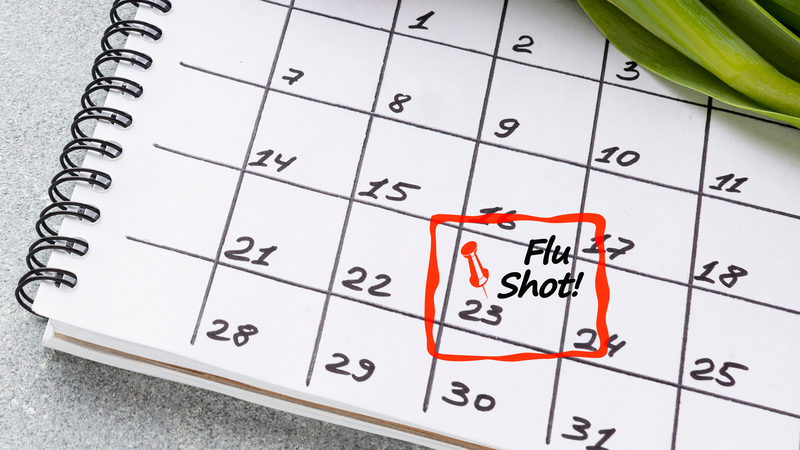The Australian Department of Health’s 2019 Influenza Season summary affirmed what most people already knew: last year we endured very high levels of activity compared to previous seasons1 and those levels were high from earlier in the year – even during the summer months. This culminated in a total of 310,011 laboratory-confirmed flu notifications by the beginning of December1. And on an even more serious note, by October 6 more than 800 influenza-associated deaths had been officially recorded - the majority of these were due to influenza A (96%, n=782) and they occurred in widely differing age groups, from under 12 months to 102 years1. Tests performed on the types of influenza responsible for these numbers revealed influenza A (H3N2) was predominant, followed by influenza A(H1N1)pdm09 and influenza B.
Types of flu vaccines in Australia
All flu vaccines now available in Australia contain antigens (molecules that trigger an immune response) for 4 strains of the influenza virus – 2 of Influenza A and 2 of Influenza B2. The WHO convenes a meeting of experts each year to determine the best formulations of the vaccine for the following winter season so they will be most effective in protecting as many people as possible against this potentially serious, or even fatal, illness2.
Recommendations on when to take the flu shot
Vaccinations for influenza are recommended annually before the flu season starts. Southern Hemisphere peak flu activity can vary from season to season but generally occurs between June and September, however infections can occur all year round, particularly in the tropical areas of Australia, as was the case in 20193.
How long does the flu vaccine take to work?
The best protection against the flu is vaccination and most people develop immunity within two weeks of receiving the vaccine4. Recent evidence suggests optimal protection occurs in the 3–4 months following vaccination, with experts recommending having the vaccine from mid-April /May 2020. Please remember, it is however never too late to be vaccinated3.
Why you should get a flu vaccine during COVID-19
It has been shown that the strict public health measures enacted to prevent the spread of SARS-CoV-2, which causes COVID-19, have already helped to reduce the transmission of influenza this year5 and there is hope that lessons learned during this time will persist into the future6. However the risk of influenza has not receded and so the Australian Heart Foundation is just one of many health agencies urging Australians to have their annual flu vaccination.
How the flu can increase your risk of heart attacks
Acute viral infections such as the flu can cause a severe inflammatory response, and this in turn can strain the heart, triggering heart failure or an abnormal heartbeat, leading to an increased risk of heart attack. According to the Manager of the Australian Heart Foundation, Natalie Raffoul, "International studies have found that the influenza vaccine can cut the risk of having a heart attack by up to 45 percent7".
Reducing the strain on the Australian Healthcare system
While the flu vaccine will not protect against COVID-19 infection, the federal and state governments are appealing to all Australians to have their influenza vaccination to help reduce potential strain on our health care system during the pandemic crisis.
How to protect yourself against the flu and COVID-19
Individuals who maintain their public health etiquette8 for COVID-19 will also minimise the risk of flu this winter: by avoiding close contact with people who are sick, staying home when you have symptoms, covering your mouth and nose with a tissue or sneezing into the inner elbow, avoiding shaking people’s hands and regularly cleaning your hands with soap and water, or using alcohol-based hand sanitisers that contain at least 60% alcohol. You should also avoid touching your eyes, nose and mouth. These health etiquettes, and getting the flu vaccination, will help to reduce your chances of picking up or passing on flu, as well as many other viruses and bacteria4, but above all, if concerned about symptoms, seek medical help or get tested to exclude COVID-19.
References
- 14 December 2018, Department of Health ‘Australian Influenza Surveillance Report and Activity Updates’. No. 12, 2019 23 September to 6 October 2019 https://www1.health.gov.au/internet/main/publishing.nsf/Content/cda-surveil-ozflu-flucurr.htm/$File/flu-12-2019.pdf
- Recommended composition of influenza virus vaccines for use in the 2020 southern hemisphere influenza season, World Health Organization, 27 September 2019 https://www.who.int/influenza/vaccines/virus/recommendations/201909_recommendation.pdf?ua=1
- National Centre for Immunisation Research and Surveillance (NCIRS) Influenza vaccines for Australians – frequently asked questions http://www.ncirs.org.au/ncirs-fact-sheets-faqs/influenza-vaccines-australians-faqs
- Immunisation Coalition Influenza Activity Surveillance 2019, ‘The Flu – it’s not a cold it’s a killer’ https://www.immunisationcoalition.org.au/news-media/the-flu-its-not-a-cold-its-a-killer/
- FluTracking online surveillance system weekly report: https://info.flutracking.net/about/
- Insight: Flu in the time of COVID-19? “all bets are off” Nicole Mackee 2020 https://insightplus.mja.com.au/2020/15/flu-in-the-time-of-covid-19-all-bets-are-off/
- ‘The Senior, A bout of the flu can leave you six times more likely to have a heart attack’: Heart Foundation, Eileen Wood 2020 https://www.thesenior.com.au/story/6749799/get-that-flu-jab-for-your-hearts-sake/
- Australian Dept. of Health Coronavirus (COVID-19) webpage: https://www.health.gov.au/news/health-alerts/novel-coronavirus-2019-ncov-health-alert#if-youre-concerned

